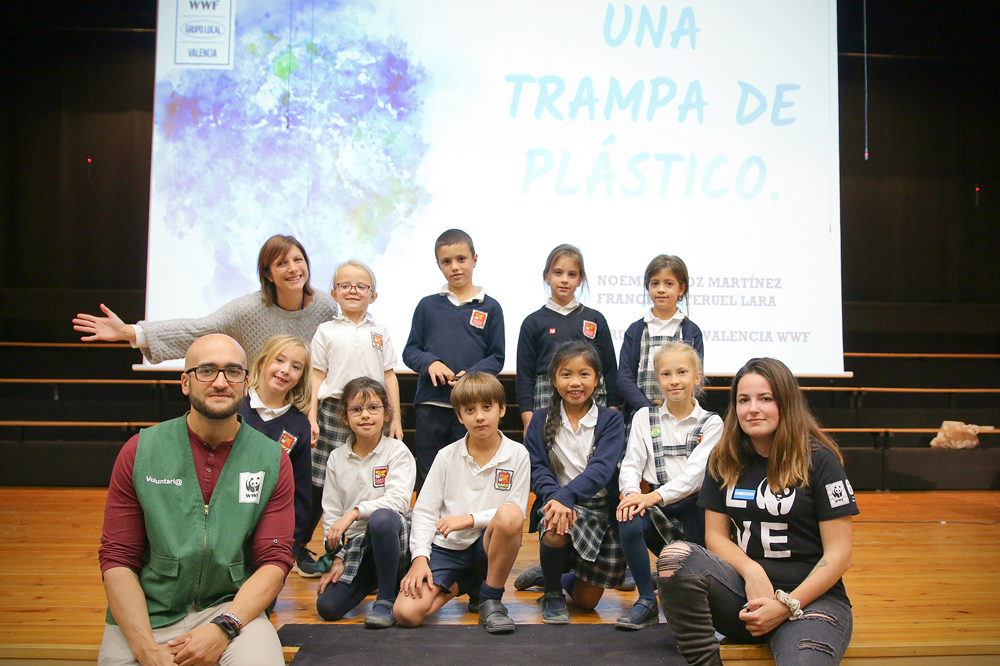
La ONG internacional da una presentación para los alumnos para concienciarlos sobre la contaminación de plásticos en el medioambiente y cómo reducir el consumo.
El impacto de los microplásticos en el mar es incesante. Una verdadera amenaza que está provocando efectos tremendamente adversos en la fauna y, consecuentemente, en las personas. Sobre este asunto, la bióloga Noemí Muñoz, miembro del grupo valenciano de World Wildlife Fund -WWF-, desveló que “los microplásticos son fragmentos de un tamaño menor a los cinco milímetros que se cuelan en la cadena alimentaria. El plancton se asemeja a estas partículas plásticas, por lo que muchos peces las ingieren por error. De este modo, cuando los humanos comemos pescado estamos introduciendo elementos nocivos de plástico en nuestro organismo”.
Este fue un claro ejemplo acerca de las graves consecuencias que está causando el uso abusivo de plástico en el planeta. Pero hubo más. Por su parte, Francisco Teruel, coordinador del grupo valenciano de WWF, aseguró que “cada año en Europa emitimos quinientos millones de toneladas de basura generada por plásticos o, lo que es igual, sesenta y seis mil camiones de basura”. Si no se toman medidas “en el año 2050 habrá más plástico que peces en los mares”, aseguró Teruel.
“Es muy importante que toméis consciencia de la importancia de estos hechos y que los contéis a vuestros amigos y familiares para que, entre todos, podamos limpiar el planeta y convertirlo en un entorno más saludable para vivir”. Con esta charla informativa los miembros solidarios de WWF se dirigieron a nuestros jóvenes, ya muy sensibilizados por la sostenibilidad del planeta gracias a las campañas de concienciación medioambiental que el colegio lleva a cabo desde hace años. De hecho, nuestros “Ecowarriors” (ecoguerreros) que promueven iniciativas ecológicas subieron al escenario para explicar, junto con los miembros de WWF, cómo reciclar residuos.
¿Qué podemos hacer para afrontar este reto? WWF propone poner en marcha las tres erres: reutilizar, reciclar y, la más importante, reducir. “Entre todos tenemos que buscar alternativas al plástico y compartir esas experiencias para hacer ver al mundo que hay muchas posibilidades para salvar al planeta de la amenaza del plástico”, concluyó Muñoz, quien junto con Teruel, pusieron de manifiesto que frenar la degradación del planeta es sencillo si actuamos de manera sostenible.
Caxton College es autor de este contenido, publicado en medios de comunicación como ABC, El Mundo, El Periódico de Aquí y Valencia Plaza.
The international NGO gave a presentation to pupils to make them aware of plastic pollution in the environment and how to reduce consumption of plastics.
The impact of microplastics on the ocean is incessant. It is a real threat and is causing tremendously adverse effects on the ocean fauna, and as a result, on human beings. The biologist Noemí Muñoz, a member of the World Wildlife Fund (WWF) team in Valencia, had this to say on the topic: ‘Microplastics are fragments smaller than 5 millimetres that end up being inadvertently incorporated into the food chain. Plankton looks very similar to these plastic particles, so many fish eat them by mistake. This is how, when we eat fish, we are putting harmful plastics into our bodies’.
This was a clear example of the serious consequences that the abusive use of plastics is having on the planet, but there were more. Francisco Teruel, co-ordinator in Valencia of the WWF team, declared that ‘every year in Europe, we produce five hundred million tonnes of plastic waste, or the equivalent of sixty-six thousand refuse trucks’. If we do not take measures to change this, ‘in the year 2050, there will be more plastic than fish in the oceans’, Teruel affirmed.
‘It is very important for you to be aware of the importance of this, and that you tell your friends and family about it, so that all of us can work together to clean up the planet and make it a healthier place to live’. With this visit, the WWF representatives informed our young pupils, who are already very aware of the importance of sustainability due to the environmental campaigns that the school has been organising for many years. Our group of ‘Eco Warriors’, who promote ecological initiatives, went onstage to help the WWF representatives explain how to properly recycle waste.
How can we take on this challenge? WWF recommends that everyone implement the three Rs: reuse, recycle and most importantly, reduce. ‘We all have to work together to find alternatives to plastic and share these discoveries so the world can see that there are many ways to save the planet from the threat of plastic’, concluded Muñoz, who together with Teruel, made it clear that stopping the deterioration of the planet is simple if we just act responsibly.
Caxton College is the author of this content, which has been published in Spanish in media such as ABC, El Mundo, El Periódico de Aquí and Valencia Plaza, and in English in Valencia International.











Leave a Reply